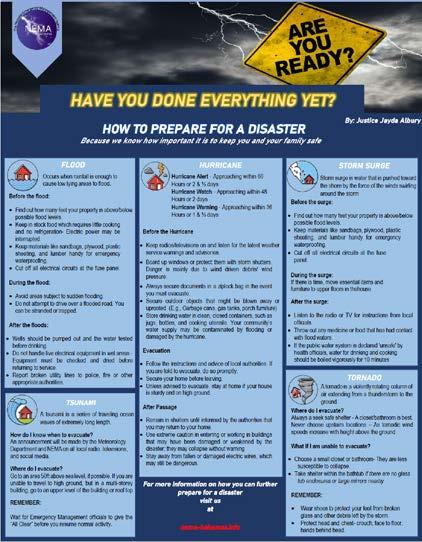
3 minute read
Alumni Feature
QUEEN’S COLLEGE ALUMNI FEATURE: JASON CAREY
Jason Carey
Advertisement
Class of 2001 (Dyer House)
Born and raised in Nassau, Bahamas, and a graduate of Queen’s College, Dr. Jason Carey is a cancer biology scientist in the molecular diagnostic oncology field with over 15 years of experience developing biomarkers for clinical research and oncology clinical trial investigation. Dr Carey earned his BS & PhD from Clark Atlanta University’s Cancer Center for Therapeutic Development.
Over his professional career, he has served in various roles across the oncology diagnostic field at MD Anderson Cancer Center, Caris Life Sciences, and Grail Inc. His research has earned several awards, including the Susan G. Komen Postdoctoral Fellowship and Organization of American States Scholarship for Graduate Studies.
Dr Carey has authored/co-authored 15 publications in leading scientific journals and presented at numerous international conferences.
Dr Carey enjoys spending time with his wife, Phiona, and son, Jason. He is an advocate for mentoring the next generation of STEM professionals.
What year did you graduate from Queen’s College? 2001
In which Sports House where you place (Dyer Health King Rogers)? Dyer, obviously!
What is your first memory of being on the QC Campus? 1987 ELC
What were your interests while you were a student at Queen’s College? I played just about every sport in high school at some point. Soccer, Volleyball, Softball, Track & Field. I was also involved in GGYA & Art What are your interests today? My primary interest is spending time with family and enjoying the opportunity to be a parent and husband.
How and why did you decide on your career path? High School Biology and Chemistry were always my favourite subjects. I thought those would be prerequisites for medical school; however, they led me down a different path to obtain my PhD in Cancer Research instead. Now I work for a company that is on the cutting edge of detecting cancer from a blood test at the earliest stages when it can be.
What would you say are the main areas in which QC has informed who you are today? What areas did it not? I spent 14 years at Queen’s College. It is the only school I have ever known while living in the Bahamas. To say I am a die-hard comet is an understatement. It is often not until you leave QC that you really start to appreciate what it meant to you and your life. Above all else, I cherish the people I met most along the way and the teachers who helped to influence and guide me.
What is your philosophy to maintain a healthy work-life balance? My philosophy presently is “NEVER AGAIN”. In choosing a scientific profession, there were times in my life that I dedicated significant time and energy to further my education and career. That was acceptable at the time, but now as a young parent and dedicated husband, my priority is to make family first a guiding principle in any endeavour.
What teacher(s) stand out in your experience at Queen’s College and why? So many choices over 14 years. Senor Dean is who I think of first, even though my Spanish is less than average even after studying it for 6 years in high school. However, it was really the experience of project Europe that Senor Dean led that helped me to appreciate the world.
However, I can not forget Mr Jones (Biology), the science teacher, Mr Foulkes, Mrs Shawn Turnquest (English), Mrs Carey (Grade 5), Mrs Evans (Grade 3), Mrs Johnson (High Scool English).
What is the most memorable day in your life on the QC Campus (give one or one in each space you inhabit - past student/past or current teacher/past or current parent)?The most memorable day that comes to mind was graduation in the QC auditorium. Not because we were actually graduating but because that marked the end of a very long journey with some of my closest friends. The equivalent of finishing the best book of your life.
Presently Dr Carey serves as a Medical Science Liaison for a USA-based molecular diagnostic company GRAIL Inc. that has developed the first blood test to detect over 50 different types of cancer. Cancer is one of the leading causes of mortality globally. With hundreds of various cancers diagnosed each year, we can only screen for 5 cancers (e.g. breast, colon, cervical, lung, and prostate). This severely limits the ability to detect cancers at their earliest stages when they can be cured, thus leaving many people

However, I can not forget Mr Jones (Biology), the science teacher, Mr Foulkes, Mrs Shawn Turnquest (English), Mrs Carey (Grade 5), Mrs Evans (Grade 3), Mrs Johnson (High Scool English).









